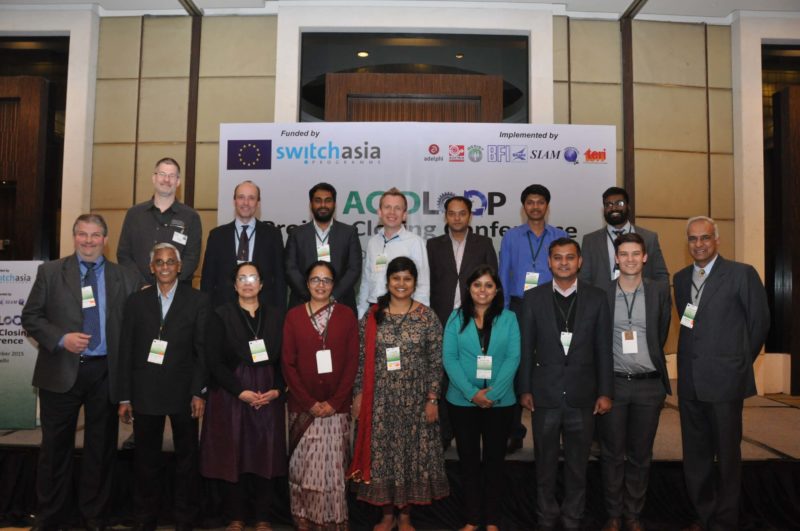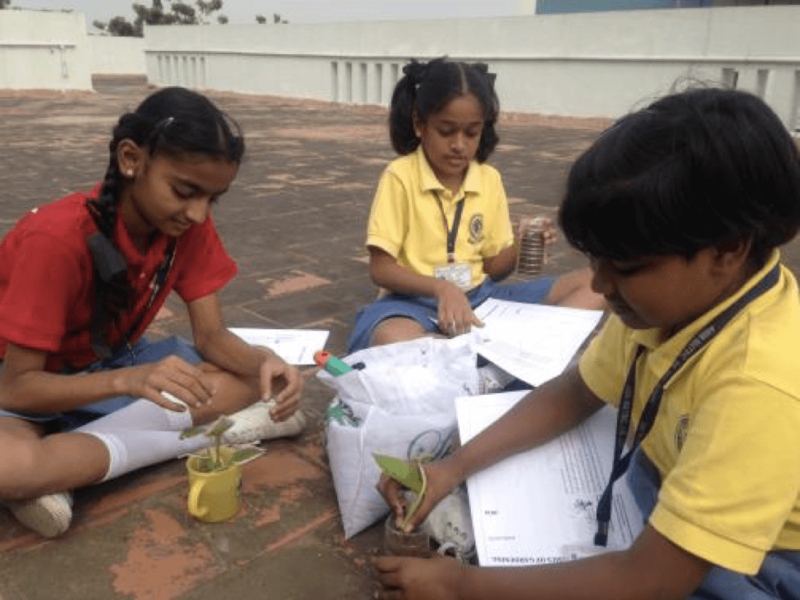
Small and medium enterprises (SMEs) constitute a major part of the ancillary industry as well as the overall manufacturing sector in India, especially those dealing with metal finishing operations. These SMEs are often constrained into using inefficient processes and technologies leading to lower competitiveness, poor environmental performance and unsafe working conditions. Moreover, they are under constant cost and time pressure from their clients up the value chain.
Sustainable production through market penetration of closed loop technologies in the metal finishing industry (ACIDLOOP) is a 4-year action under the European Commission’s SWITCH-Asia Programme, which aimed to introduce technology innovation as well as resource efficiency in the metal finishing companies (SMEs) that would lead to improved environmental quality and combat pollution through advanced water treatment measures and energy efficient processes. The objectives of the project were (a) improved urban environmental quality in the urban regions of National Capital Region (NCR) and Chandigarh, Pune, Ahmedabad and Chennai; (b) improved living conditions in the target regions and (c) improved production technologies.
Some of the important activities carried out to achieve the project objectives include raising awareness and delivery of trainings on the concept of closed loop technologies, adaptation of resource efficiency toolkits and individual consultations on resource efficiency and acid recovery measures. ACIDLOOP was able to benefit a total of 106 companies through the individual consultation on resource efficiency and acid recovery measures. This resulted in an average decrease of more than 20% of material, energy and water consumption in participating companies across all regions. In addition to this practical demonstration, two acid recycling and one water recycling technologies were also showcased across all target regions.
Industrialization has the potential to help achieve poverty eradication, improve gender equality and labour standards and provide greater access to education and healthcare. At the same time, industrial processes play a major role in the degradation of the global environment. Industries in developing countries have significant potential to reduce the material, energy, and pollution per unit of industrial output.
The project’s aim was to implement a sustainable industrial development programme through the promotion of resource efficiency and waste management practices benchmarked on international standards. The envisaged outcome of the project was to help the supply chain factories of footwear, apparel and accessories (FAA) sectors in the developing countries of Asia (Bangladesh, Cambodia, Indonesia and China) to reduce their energy, water, waste and CO2 emission by 25% by 2015, compared to the 2011 baseline, and to contribute to a green economy and sustainable industrial development.
Over the course of the project, more than 500 attendees were trained and 35 factories participated from the target countries. The project resulted in total savings of USD 4 million in the first year with an average payback period of 2.5 years, 62,000 MWh per annum of energy saved (equivalent to 44,500 tons per annum of carbon dioxide emissions), nearly 633,000 m3 per annum of water saved and approximately 660 tonnes per annum of waste reduced.
Sri Lanka generates an estimated 6,700 metric tons of waste daily – out of which only 2,800 is collected. The absence of an efficient system to clean up the waste has brought about a need to create a well-organized waste management system in Sri-Lanka to avoid the spread of toxic chemicals and pollution in the environment.
PROMISE is a private sector partnership (PSP) project between DEG and Holcim (Lanka) Geocycle Limited, in partnership with ASSIST, that aimed to provide an appropriate solution to the unorganised dumping and burning of waste in Sri Lanka. Thus, a waste management complex was set up at the Seeduwa dump site – which is surrounded by two key industrial zones called Katunayake and Biyagama, the country’s largest housing scheme called Raddolugama and the main airport in Sri Lanka (Katunayake Bandaranaike International Airport).
ASSIST undertook various interventions to ensure the sustainability and effectiveness of PROMISE. The waste management complex included a fully operational material receiving and segregating site. Training was facilitated for the surrounding communities, municipal / government offices, and urban councils. Green clubs promoting proper waste management and green bank facilities for collecting waste were set up in local schools and universities. Involving households and neighbourhoods in the establishment of a waste management ecosystem was essential to the project’s success.
i2Can – Inspiring and Igniting Young Minds is a series of experiential learning programs designed to provide in-school children with a combination of simple life skills and awaken in them the passion for green, clean and safe living. More specifically, the focus is on instilling the right values and skills on health, sanitation and hygiene, first-aid and emergency response, green living philosophy (reduce, reuse, recycle), ethics and morals and problem-solving and decision-making, which would enable the youth to become agents of change.
Through the above initiatives, i2Can aims to empower these young people to learn, practice, and thrive in their communities. They are also actively encouraged to share their knowledge with their immediate family and friends. The key beneficiaries of this programme are the urban poor and rural communities.
ASSIST undertook various activities during the implementation of this project that included teaching using live demonstrations, activity-based learning, workshops, seminars and lectures. By the end of 2017, i2Can had reached over 20,000 students and involved more than 450 schools in the southern state of Tamil Nadu, India.

School gardens serve as living laboratories where academic subjects can be integrated and the children can be active participants in the learning process.
In order to introduce children to such learning, 1,2,3 Grow was an initiative that promoted the creation of gardens at schools in the Indian state of Tamil Nadu. The main aim behind 1,2,3 Grow was for children to gain appreciation and respect for the environment that lasts into adulthood. The initiative also aimed to promote improved social skills amongst school children such as, working in groups and problem-solving; and to prepare them for higher education.
Gardens were built in private schools where children could practice their social skills and learn how to grow plants from which they get healthy food to eat. Workshops were also conducted as a supplementary activity to these pilot gardens.
From 2000 to 2012, natural disasters in the Philippines took the lives of 12,899 people and injured 138,116. As part of ASSIST’s Social Actions, the board game Master of Disaster was developed to raise awareness among children and stimulate their interest on what leads to man-made disasters and more importantly, teach them how to respond to emergency situations. The game will teach children both, the values of independent thinking and teamwork, in addition to helping them build a strong sense of discipline and strategic decision-making while they are young.
Master of Disaster was created through an iterative development model centered on study and consultation, which ensured both education and entertainment. Gamification experts, disaster response experts, teachers, students and parents all participated in the development of this board game. By mid-2017, we had conducted tests with 200 students of varying ages, across 15 schools and community centers along with the facilitation of 75 teachers. This board game is distributed free of cost to public schools in the most disaster-prone areas.
Over the past 20 years, Vietnam has developed into one of the major food processors and exporters in the global market. However, product safety and quality control has become a major concern to the Vietnamese authorities. With increasing awareness and consumers’ expectations of health and food hygiene issues, the low performance in meeting the requirements of food safety principles and standards are seen as major obstacles for further growth of the food industry, especially when it comes to exporting agricultural products.
This distinct private sector partnership (PSP) project organized by DEG, TÜV Rheinland and ASSIST, aimed to create a broad impact on Agro and Dairy food safety and hygiene awareness throughout Vietnam’s entire supply chain. Awareness campaigns, forums, trainings and certification programs were designed to build local capability. Dialogue sessions were conducted with the aim of reviewing the gaps and making changes to support small and medium enterprises in agro – dairy producing industries in adopting best international practices for safety and quality. e-learning kits and self-audit guides were also built to help the target industries strengthen their quality control activities and to sustain the project in the long term.
Targeting Vietnam’s agricultural and dairy supply chain, this DEG-supported project features awareness campaigns as well as training and certification programs – all of which were designed to build local capability and create a multiplier effect. Dialogue sessions with policymakers and representatives of different stakeholder groups were conducted to assess the gaps and propose changes to support the agro-dairy SMEs in adopting international safety and quality standards.
Myanmar’s recent political shift has given rise to a market-oriented economy and the performance of the import and export sector is underpinned by increasing production and industrial development. The food sector is the one at the forefront, representing 63.51% of the overall industrial sector in Myanmar. Hand-in-hand with this development comes the call of international and local organizations for better conditions in the food industry and adoption of international food safety standards.
Bureau Veritas together with ASSIST, is working to raise awareness about food safety through introducing food safety requirements based GMP (Good Manufacturing Practices) and HACCP scope to the fruits processing industry in Myanmar; to minimize risks to business and consumers and ensure that products uphold international quality standards. This would also benefit factories, enabling them to produce better products, increase production and enjoy increased sales and exports.
This project will engage industry owners and fruit companies to engage with each other and generate commitment to implement and promote food safety standards and resource-efficient practices in the industry. Training programs will capacitate food safety experts and create local consultants on GMP and HACCP to provide guidance for 20 fruit processing factories in compliance with standard requirements. These factories will also receive training on compliance, assessment visits, and certification.
Vietnam’s fast-growing food processing and food export enterprises have been grossly challenged by the low level of awareness on multilateral regulations covering the food industry. The non-availability of appropriate laws and the lower levels of enforcement by the government have further aggravated the situation.
ASSIST together with TÜV Rheinland Vietnam Co. Ltd and DEG, launched a project that targeted the agro and dairy food exporting and food processing industry of Vietnam located in the Central area (Da Nang City), Ho Chi Minh City and Can Tho Province in the Mekong Delta.
In order to achieve set project objectives, the project created a mass-based awareness on the governing international food standards (HACCP/ISO 22000) and international food safety regulations. Technical seminars in multiple provinces have also qualified 75 local trainers. e-learning modules on food safety, self-implementation guidelines and self-audit guides were also compressed into kits which were distributed for knowledge propagation.



